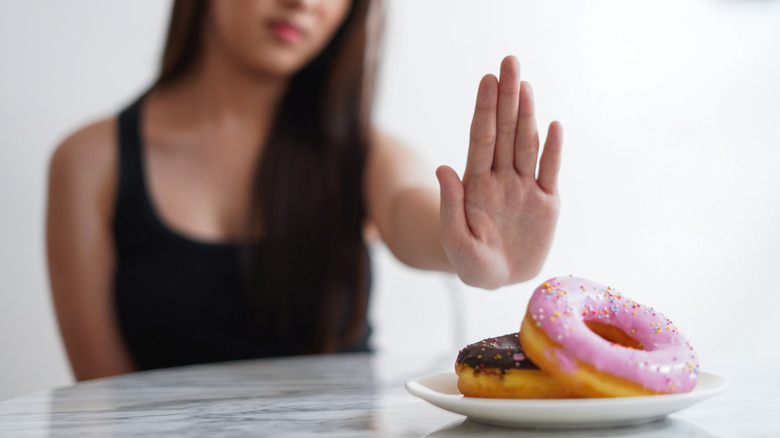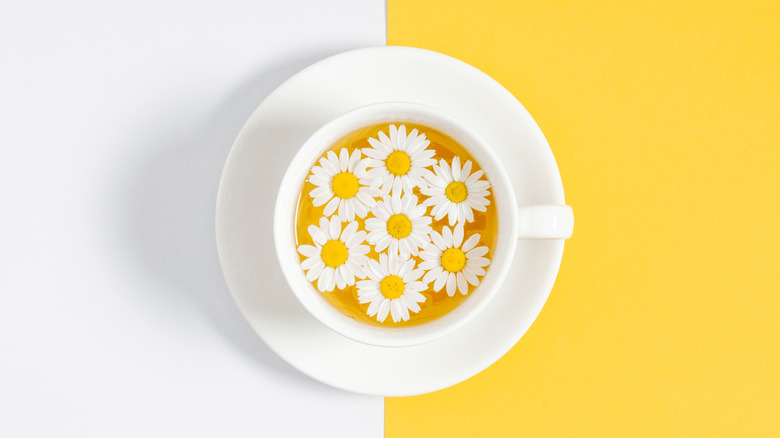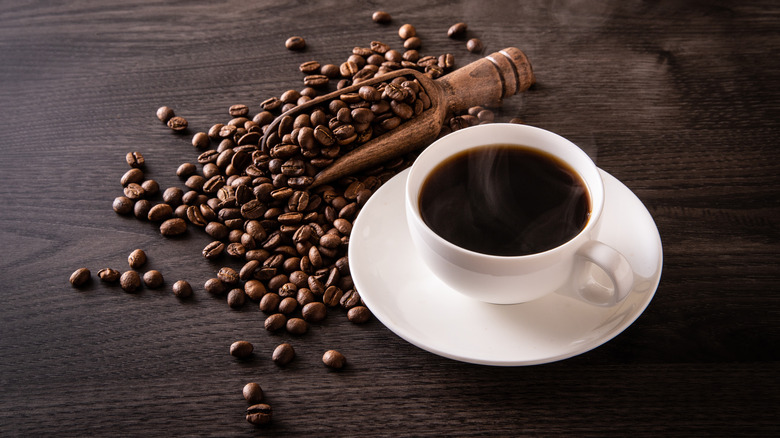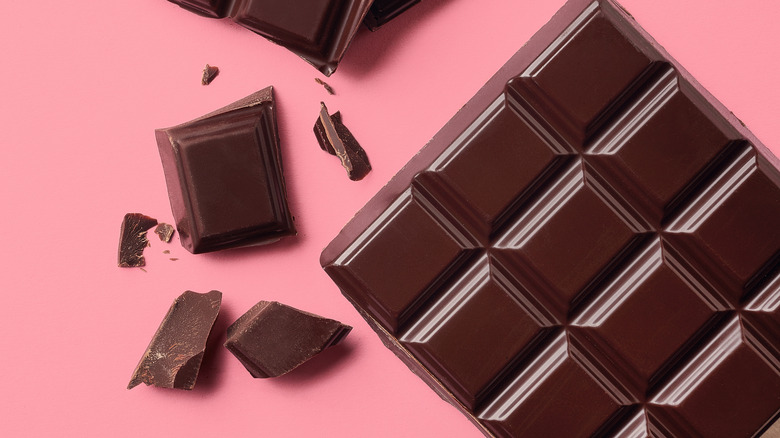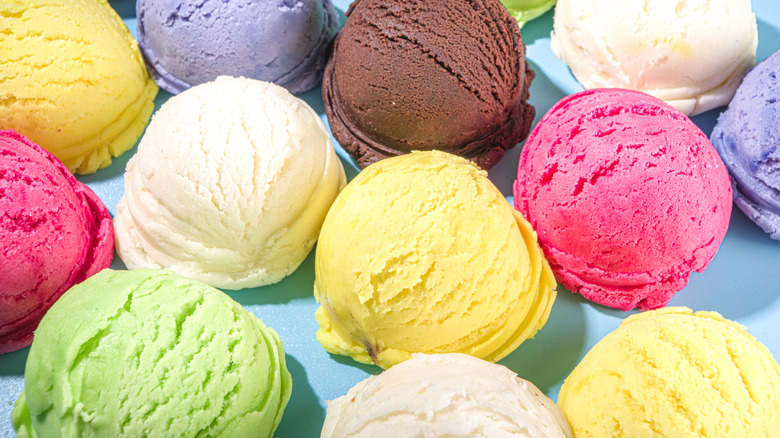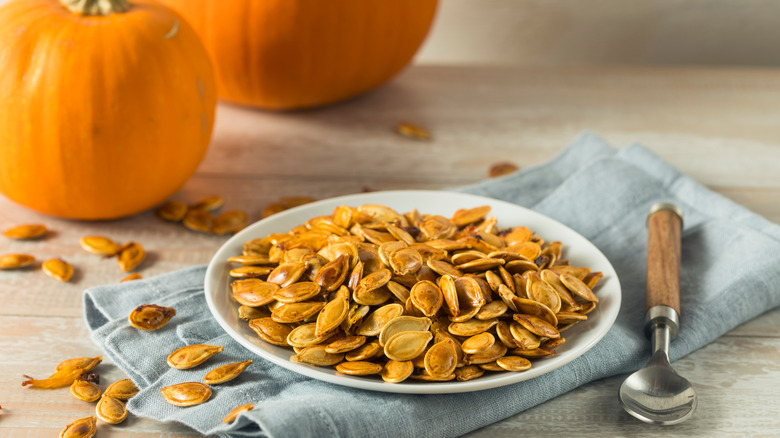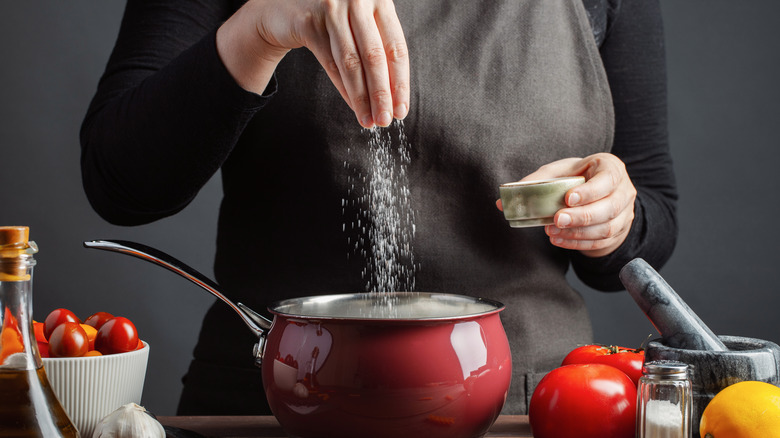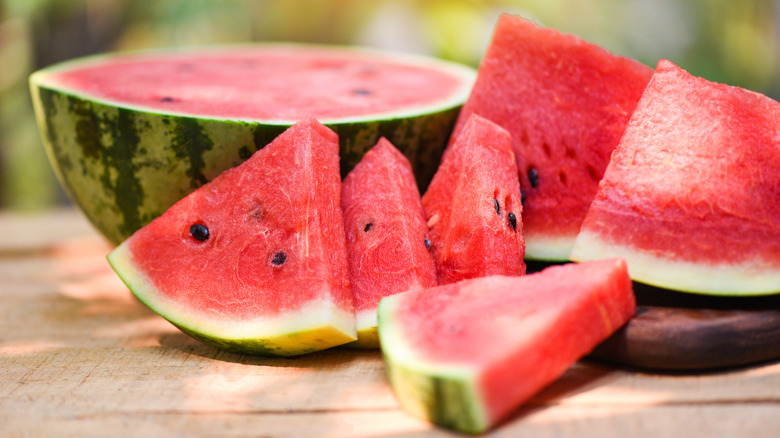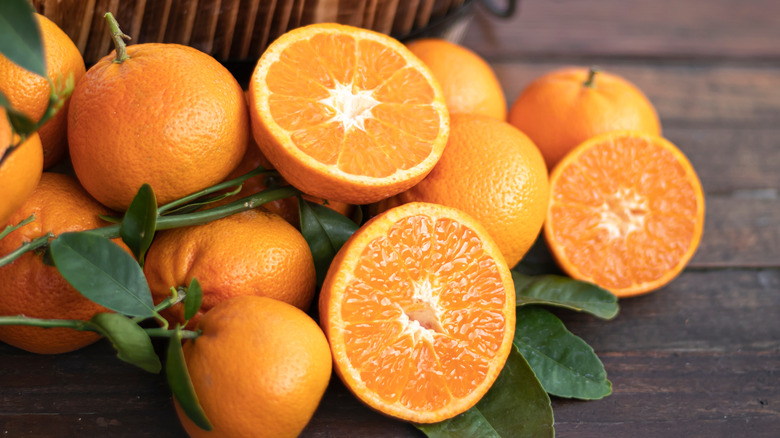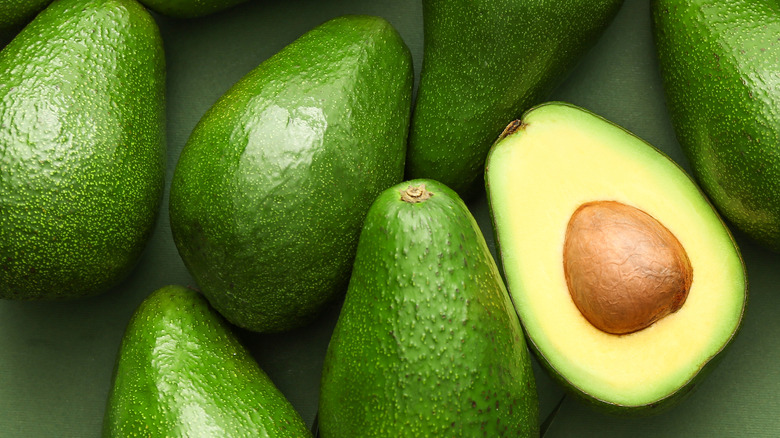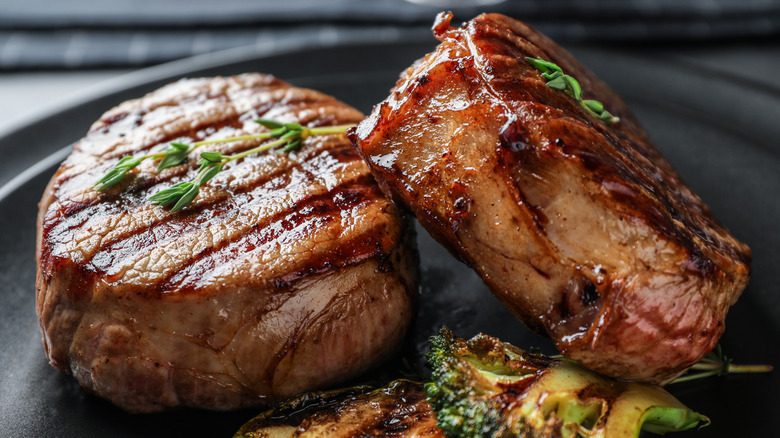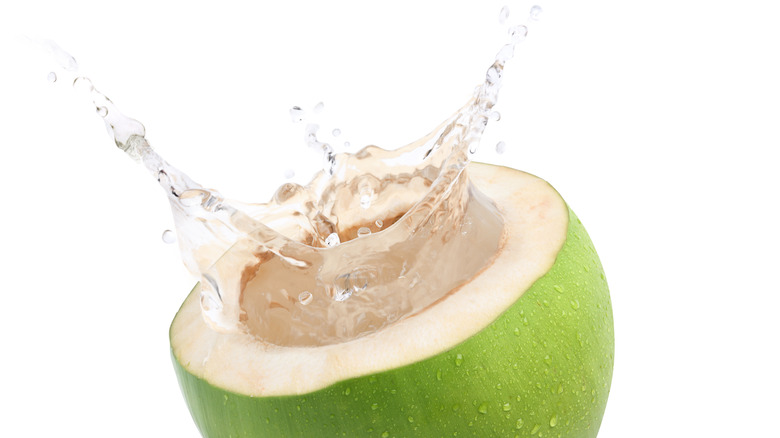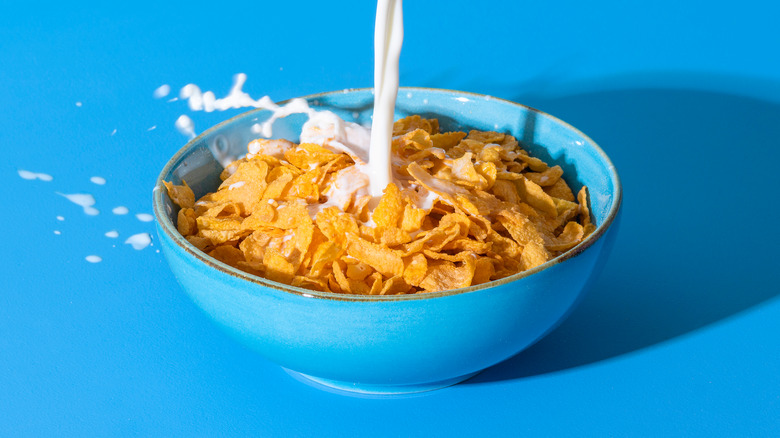7 Foods To Eat During Your Period And 7 To Avoid
From "time of the month" to "Aunt Flo," there are plenty of nicknames for menstruation. But even though we have a slew of sometimes funny names for it, a study published in the American Journal of Obstetrics and Gynecology found that women and girls don't like to talk about how their periods make their day-to-day lives more difficult. In fact, the majority of the study's 43,000 participants didn't even want to tell their doctors if they were experiencing a heavy flow or discomfort.
"We think there is a taboo on menstrual symptoms, mainly because women think this is just a normal part of life," said Dr. Mark Schoep, the study's author (via Reuters). When a girl is first taught about her period, she's likely told about its possible symptoms like cramping and bloating. And when other girls and women in her life confirm how menstruation is unpleasant, it can seem like expressing real concern or frustration will come across as complaining about something uncontrollable. However, that's a half truth.
Yes, there are aspects of menstruation that cannot be changed, but as Dr. Trine Stanley Karlsson of the University Hospital Karolinska in Stockholm, Sweden, told Reuters, "... many symptoms without any underlying medical condition can be effectively treated very easily." For example, certain foods and beverages might lessen or amplify menstruation-related symptoms. So, if your time of the month is making it harder to do what you want and need to do, simple adjustments to your diet could help.
Try: Chamomile tea
While it might not be possible to completely get rid of the painful cramps and bloating connected to your time of the month, the Mayo Clinic recommends "warm beverages" to help sooth these unpleasant period symptoms. But anyone who has been to a Starbucks can tell you there are a wide variety of warm beverages, some of which contain caffeine that can make menstrual cramps more painful (via Insider). Fortunately, there is a member of the tea family that's not only caffeine free, but also has shown promise as a way to naturally help manage menstruation-related pain.
Indeed, research has found chamomile tea could be beneficial for a number of health concerns, including menstrual cramps. A study in the Iranian Journal of Obstetrics, Gynecology and Infertility concluded that drinking chamomile tea might make cramps less severe both physically and emotionally. As it turns out, the true power behind chamomile's ability to tame period pain might have to do with it improving the quality of sleep someone can get during their period (via Healthline).
Beyond potentially helping with sleep and fatigue, a study by the Korean Pharmacopuncture Institute found that chamomile tea might also reduce the heaviness of one's period. So, if you have discomfort during your time of the month, you might want to brew yourself a cup of this tea. For the best results, drink your chamomile tea unsweetened, since sugar can also worsen period symptoms (via Cleveland Clinic).
Avoid: Too much caffeine
For many, their day doesn't begin until they've had that first cup of coffee — or maybe those first two or three cups. Unfortunately, endocrinologist Dr. Rocio Salas-Whalen cautioned Insider that the caffeine in beverages like coffee can mean more cramps during your time of the month.
To fully understand how caffeine can make your period more painful, we need to talk about how your circulatory system works. Remember, your blood vessels don't stay at the same size all the time. They can become wider or narrower, which impacts how your blood circulates throughout your body. Caffeine can cause them to narrow, and according to Dr. Salas-Whalen, that narrowing can make a case of period-related cramps more severe. So, consequently, the more caffeine you consume, the worse your cramps could become.
Although caffeine can negatively impact your period, that doesn't necessarily mean you need to cut it out entirely. For example, if you like three cups of coffee over a 24-hour period, Dr. Salas-Whalen recommends reducing that number to one cup during your flow. And there's always decaf coffee, but don't let the name fool you. As Nathan Arnold, a spokesperson for the Food and Drug Administration, told SELF, "It is almost impossible to remove all the caffeine from a coffee bean." So if you want to cut back on caffeine by switching to decaf, you still need to exercise good portion control.
Try: Dark chocolate
This next food comes with some fine print. As WebMD notes, the higher the amount of cocoa in dark chocolate, the more caffeine it contains. And according to Insider, caffeine can make menstrual cramps more severe. Plus, some manufacturers add sugar to dark chocolate, and sugar can also worsen period symptoms (via Cleveland Clinic).
Okay, so why is dark chocolate possibly good for menstruation if it has two strikes like that against it? Well, a research review published in the journal Nutrition Reviews concluded chocolate can have a positive impact on mood. Additionally, an analysis published in the International Journal of Food Sciences and Nutrition explained that dark chocolate contains iron, which can drop during menstruation — so this iron boost can help stave off anemia (via Medical News Today). The analysis also says dark chocolate has magnesium, and research published in the journal Health Promotion Perspectives connected really bad cases of premenstrual syndrome (PMS) to low levels of magnesium. Plus, magnesium might also help with menstrual cramps and period-related exhaustion (via Well+Good).
With all the possible pros and cons when it comes to dark chocolate, it's especially important to check the Nutritional Information Panel on brands of dark chocolate for sugar and cocoa content. There might be some trial and error finding just the right percentage of cocoa to ease some of your menstrual symptoms without triggering other ones. And, of course, portion control is key, so as comforting as chocolate can be, avoid binging on it.
Avoid: Ice cream sundaes
Sorry, but those sugar-loaded sundaes we tend to dive into when we're feeling our worst are bad choices if you have your period. As ob-gyn Cristina McClure tells the Cleveland Clinic, "Foods that are really sugary and sweet will increase your insulin levels, and high insulin levels can cause imbalances in other female-factor hormones." Not only do sugary treats contribute to bloating, but the spike they cause in your blood sugar can lead to period-related headaches and dips in energy.
Additionally, traditional ice cream is made from cow's milk, and if those cows were given extra hormones, then you could be consuming estrogen. Now to be fair, how much the hormones being administered to animals impacts humans is still being debated (via WebMD). But the concern is that consuming more estrogen could cause a woman's uterine lining to become thicker than normal, leading your body to make higher amounts of compounds called prostaglandins. And as Healthline explains, more prostaglandins can mean more painful menstrual cramps.
But wait, it gets worse. According to Dr. McClure, it's not enough to stop eating ice cream sundaes at the beginning of your period (via Cleveland Clinic). To get the best results, she recommends cutting back on your sugar "... at least a couple of weeks before your expected period."
Try: Pumpkin seeds
Yes, those little seeds that you throw out when you make a jack-o-lantern can be just the snack to help you tame not only menstrual symptoms but also PMS and PMDD (via Everyday Health). And in case you're wondering, PMDD, or premenstrual dysphoric disorder, can have some of the same symptoms of PMS (exhaustion, bloating, food cravings, etc.) but also can cause some emotionally debilitating symptoms like anxiety, anger, and a feeling of hopelessness (via Mayo Clinic).
So, what is it about these seeds that make them a good food choice for your time of the month? Well, as registered dietician Tracy Lockwood Beckerman tells Well+Good, pumpkin seeds are a good source of magnesium, and she advises eating more foods with high magnesium content the week before menstruating to reduce unpleasant period-related symptoms like cramping and exhaustion. Additionally, registered dietitian nutritionist Robin Foroutan told Everyday Health that magnesium can be a good natural way to manage headaches caused by PMS and PMDD.
Pumpkin seeds are also good sources of the minerals copper, selenium, and zinc, all of which can have a positive effect on how long and deeply you sleep — and this can help your body manage pain and discomfort (via WebMD).
Avoid: Too much salt
Let's be honest, most people would probably consume sodium even if it wasn't an electrolyte that the body needs to function properly (via MedlinePlus). And if you doubt that, think about the last time you were in a restaurant that didn't have saltshakers on its tables. Yes, a little salt can really bring out the flavor in some foods, but too much of it can be a bad move if you have your period.
As dietician Elizabeth Somer told WebMD, cutting down on how much salt you eat around your time of the month can help with PMS. Specifically, eating more salt leading up to your period can worsen that bloated feeling that sometimes carries over into menstruation, as salt causes the body to retain water. But Somer also noted that eating less salt can be challenging, since so many products contain sodium. In fact, the University of California San Francisco lists on its website a number of foods and condiments that are high in salt. While some are obvious like salted butter, others might surprise you. For example, although we associate instant pudding with sweetness, it can be high in sodium. Also, canned products like vegetables and beans sometimes contain large amounts of salt.
Even though reducing salt to help with period symptoms can be difficult, Somer does have a simple suggestion: Drink more water (via WebMD). Yes, when you're feeling bloated, a tall glass of water might sound pretty unappealing; but as she explains, water can help flush out excess sodium.
Try: Melon
One of the most unpleasant symptoms of a period is feeling constantly bloated. There is, however, a reason behind this aspect of both menstruation and PMS. According to Eat This, Not That!, part of the menstrual cycle involves the body accumulating higher amounts of both fluids and salts. So, yes, that bloated feeling is tied to a normal bodily function, but that doesn't mean there aren't ways to manage it.
As registered dietician April Bruns told Eat This, Not That! eating more members of the melon family can help keep period-related bloating from becoming really uncomfortable. "Melon is made mostly of water and is a natural diuretic, which means it can help cure that puffy feeling you get during your period," Bruns explained. Because melons have a high water content, they are perfect snacks for avoiding dehydration, which can contribute to menstrual cramps as well as feelings of negativity. And there's still more good news. According to Mayo Clinic, one of the most popular melons, the watermelon, is a great choice for managing the symptoms of menstruation. Not only are watermelons packed with water, but they are are good sources of magnesium and potassium (via Healthline) — both minerals that can help ease period symptoms (via Livestrong).
Avoid: Pizza
While pizza is the favorite food of the Teenage Mutant Ninja Turtles, it should not be on your grocery list if you have your period. And, no, even picking a pie that doesn't have unhealthy toppings like fatty meats isn't going to make this period no-no alright to eat, especially in large amounts.
Unfortunately, pizza can make those unpleasant cramps that all too often come with menstruation even more painful (via Insider). This is because pizza usually contains saturated fats, which can lead to inflammation. In fact, MedlinePlus singles out pizza as a food that is loaded with these unhealthy fats, especially since it's made from high-in-saturated-fat ingredients like cheese. And speaking of cheese, high amounts of dairy can also be problematic for some women around their time of the month. Cramps aside, Healthline points out that products made from cow's milk can worsen period-related bloating, as well as other unpleasant menstrual symptoms like diarrhea and flatulence (via Insider).
But wait, the possible period problems from pizza don't end there. The University of California San Francisco lists both regular and frozen pizza as commonly high in sodium. And if you guessed that eating too much sodium can make you feel more bloated both before and during your period, you'd be absolutely right (via WebMD).
Try: Oranges
The first thing that pops into most people's minds when they think of oranges and health is that they're a great source of vitamin C and therefore good for the common cold. But don't sell this citrus fruit short. It can also be the perfect snack choice if your iron dips too low during your time of the month.
The natural process of losing blood during your period can be taxing on your body. Specifically, as you lose red blood cells through menstruation, you also lose iron (via Flo Health). But eating foods rich in vitamin C like oranges can help your body better absorb iron and help you avoid period-related anemia, a condition that can zap your energy. Additionally, oranges are a great source of vitamin D, which can potentially help with the more painful symptoms of menstruation. According to a study conducted by the University of Messina, vitamin D might be helpful for both teenagers and women who experience dysmenorrhea, a particularly painful type of menstruation that can include symptoms like vomiting and diarrhea (via WebMD).
Besides having vitamins C and D, oranges are also packed with potassium and magnesium (via Flo Health). Remember, magnesium might help reduce the severity of period-related symptoms like cramping and exhaustion (via Well+Good). And research shows that potassium could help someone with their period keep up with everyday activities like exercising (via Livestrong).
Avoid: Alcohol
Whether you enjoy a light beer, mixed drinks, or harder beverages, alcohol at minimum can worsen some menstrual symptoms. As Everyday Health notes, this is because alcohol can impact blood sugar levels — and as the "Period Girl" Nicole Jardim told Well+Good, blood sugar levels that are out of whack can then cause fluctuating hormone levels as well. Together, these things are a recipe for creating period-related symptoms as exhaustion, headaches, and nervousness.
Besides fluctuating blood sugar, alcohol can also worsen another common complain of menstruation, tenderness in the breasts (via Everyday Health). And as if that wasn't enough to volunteer to be the designated driver, the National Institute on Alcohol Abuse and Alcoholism warns that heavy drinkers could experience an irregular period (via Shape). And while this reaction to high amounts of alcohol is still being researched, one possible reason behind it could be that alcohol might throw off your testosterone and estrogen levels. Remember, ovulation can be affected by the incorrect amount of hormones at the wrong time, which can lead to missed periods.
So, does this mean that you definitely can't touch alcohol during your period? Not necessarily, but keep in mind that there is no one-size-fits-all amount of alcohol that will never disrupt or worsen any woman's period 100% of the time (via Shape).
Try: Avocados
Did you know that there's more potassium in avocados than in bananas (via Medical News Today)? In fact, just one of these fruits that's been topping toast now for years is packed with roughly 975 mg of potassium (via MedicineNet). A standard sized banana only has around half that amount. And that should be music to your ears especially if you have your period.
As MedicineNet explains, muscle cramps like one experienced during menstruation occur because the muscles are overly tense. However, eating foods that contain electrolytes like potassium can help your muscles function normally and in the process at least lessen, if not avoid, painful cramping. In addition, avocados are also good sources of another muscle-supporting electrolyte: magnesium (via Medical News Today). And bonus, magnesium might also help with those headaches that can happen during PMS and PMDD (via Everyday Health).
In addition, avocados are also a good source of vitamin E (via Medical News Today), which might help with breast tenderness that can happen during menstruation and PMS (via Everyday Health). Plus, avocados contain vitamin C. Remember, women often lose iron during menstruation, but vitamin C can help your body absorb more iron (via Flo Health). However, as MedicineNet points out, avocados are higher in fat than other fruits. With that said, they contain monounsaturated fatty acids, which are much healthier than trans or saturated fats (via Medical News Today).
Avoid: Red meat
On the one hand, red meat is a good source of iron (via Red Cross). And since menstruation involves losing blood, a person's body can experience low iron as a result of their period (via Medical News Today). However, there's enough concern and debate about red meat that it's a questionable food choice during your time of the month.
As MedlinePlus points out, red meat contains high amounts of saturated fat. Because of this, it has the potential to ratchet up the inflammation in your body and make your period more painful and unpleasant (via Insider). But beyond its saturated fat content, red meat, as well as other products that come from or are made from livestock, are a subject of debate in the scientific community because of how the animals are raised. According to WebMD, livestock are given hormones that speed up how quickly they gain weight. These added hormones are then passed along to humans who consume the animals' meat. So, can these hormones affect humans, and if so, to what extent? That is not conclusively known at this time. But the director of Walk IN GYN Care in New York City, Dr. Adeeti Gupta, told Livestrong that the hormones in red meat have the potential to throw off your own hormones and in the process lead to issues with your period.
Try: Coconut water
Often we assume hormones are the culprits behind some of the more unpleasant symptoms caused by menstruation. However, this isn't always the case. For example, it's not uncommon for a person to have diarrhea during PMS or menstruation, but the direct cause of it are chemicals called prostaglandins that help your uterus shed its lining (via Medical News Today). Fortunately, sweet coconut water can help with the negative effects of loose bowel movements because it not only helps one stay hydrated, but unlike straight water, it also contains electrolytes. Specifically, coconut water has the electrolytes potassium, magnesium, and calcium (via Healthline) — and these minerals are vital to replenish after diarrhea, as the body tends to clear them out along with the waste (via DiaResQ).
Although coconut water can be a good way to manage the negative impact of period-related diarrhea on your body, it does have one downside. As Healthline points out, coconut water contains carbs and sugar. In fact, according to the U.S. Department of Agriculture, one cup of coconut water has roughly 8 grams of sugar and 15 grams of carbohydrates. So, you might want to cut your coconut water with regular water to avoid overdoing your sugar intake.
Avoid: Processed foods
Even with meal delivery kits being all the rage, there's something ridiculously simple about snacks and dishes made from processed foods. After all, who hasn't thrown a frozen, plastic-sealed meal into the microwave when they're rushed for time, or popped open a bag of something crunchy and convenient after a hard day of work? But as the Cleveland Clinic notes, these processed foods are a recipe for inflammation, which can increase period pain.
Before we go any further, it's important to note that not all foods under the umbrella term "processed foods" are necessarily bad for your health. As Medical News Today explains, foods can be mechanically processed, such as when some foods are pasteurized. However, issues can arise when foods are chemically processed, meaning they can have added artificial sweeteners and colors, and tend to be made from the refined (and so less nutritious) versions of ingredients. And according to the Cleveland Clinic, processed foods also often contain refined sugar and high fructose corn syrup, as well as soybean and corn oils, all of which can cause inflammation.
Although some chemically processed food products are easy to spot, not every one comes from the freezer aisle and covered in plastic. Breakfast cereals, crackers, instant noodles, and even breads can all fall under the category of processed foods (via Medical News Today). Other possible ones to watch out for include sodas, pastries, and soups.

